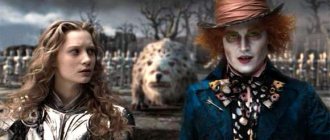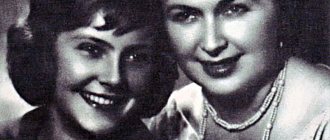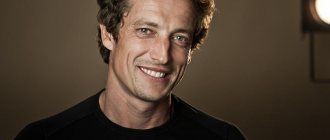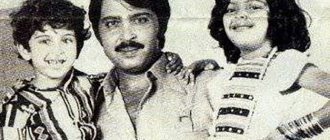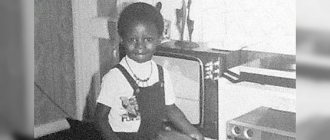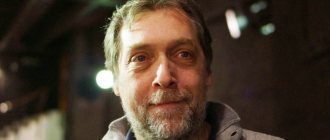Family history
The father of the future actor, a Pole by birth, came to the USSR in 1933 to participate in the construction of a new, socialist world. He, like many Europeans, idealized Soviet power and paid dearly for it. He worked in a confectionery factory and was arrested on charges of espionage and executed in the fall of 1937, when his son was only a few months old. Therefore, Albert Filozov grew up without knowing his father. His mother came from a wealthy Ukrainian family. Her parents moved to Siberia during the Stolypin reforms. When collectivization began, Albert’s grandfather, under the threat of dispossession, left for Sverdlovsk.
Albert Filozov
Born on June 25, 1937 in Sverdlovsk. Albert Filozov's maternal ancestors were wealthy peasants from Ukraine. In the early 30s of the twentieth century, they, fearing dispossession, moved to the Urals, to Sverdlovsk. Here Albert’s mother met his father, who came from Poland to Russia to build socialism. Albert Leonidovich says that he does not remember his father at all - he was arrested and shot as an “enemy of the people” in 1937. Albert Filozov was not even six months old at that time...
Fortunately, the position of “son of an enemy of the people” did not greatly affect young Albert. His childhood passed like that of other boys of that time: he played in the yard, played football, fought. He also loved to read and constantly ran to the library for books. True, when everyone was accepted into the Komsomol, the young man did not apply for a long time, considering himself unworthy, and decided to join only when Stalin died.
Albert Filozov became independent early. The times were hard and hungry, and after the seventh grade he went to work at a ball-bearing factory, where he received the profession of a turner. The young man, like many, received his secondary education at evening school.
Albert Filozov never thought about the acting profession, although he listened with enthusiasm to the “Theater at the Microphone” program on the radio. At that time, radio versions of performances by the Maly Theater, Moscow Art Theater, and Vakhtangov Theater were often broadcast. As Albert Leonidovich recalls, he especially liked “The Bedbug” of the Satire Theater: he even learned the whole act by heart.
Admission to a theater university turned out to be spontaneous. In 1955, the Moscow Art Theater came to Sverdlovsk on tour, and enrollment was announced for the Studio School. Albert Leonidovich recalls: “At that time I had just finished school. A friend literally dragged me to the exams by force, for company. It is clear that I was not worried at all, so I successfully passed all three qualifying rounds and went to Moscow to take general education subjects. I liked Moscow right away, and I decided that I would never leave it again...”
Albert Filozov had the opportunity to study at the course of the brilliant Moscow Art Theater actor Viktor Stanitsyn. Life for students of that time was harsh: cold, hunger. They lived in former barracks, where Austrian prisoners had previously been housed. There was no hot water, and in winter snow fell into the window cracks. But all this faded into the background before the rapture of study. And studying continued around the clock: from morning to evening at lectures, and in the evening in the dormitory students acted out sketches. Probably, it is in such conditions that real Masters are born. After all, the following students studied with Filozov on the course: Anatoly Romashin, Vyacheslav Nevinny, Alla Pokrovskaya, Alexander Lazarev, Tatyana Lavrova - the future color of Russian cinema and theater.
In the third year, Albert Filozov’s film debut could have taken place. The young actor successfully auditioned for the film “The Green Van” and was approved for the role. The only thing he was very afraid of was the reaction of the management of the Moscow Art Theater School, because students were strictly forbidden to act in films. The filmmakers promised to resolve this issue.
Filozov flew to Odessa to sign the contract (having stocked up on a return ticket just in case). He was met at the airport and given a form there: “Fill it out here and sign.” “What about the institute?” - asked the young man. And then it turned out that they had not agreed on anything. The actor still recalls his further behavior with shame: “... I went to drink water and... ran away. The landing had already been announced, I ran across the entire airfield, and the director and administrator ran after me. I run up to the plane, and the ramp has already been pulled away, I wave my ticket, I scream... Well, the plane was small, I jumped, grabbed it, pulled myself up and climbed into the door that was not yet closed. And he flew away. As a punishment for my cowardice, they didn’t film me for ten years - they tried, they promised, but it never came to filming...”
After graduating in 1959, Albert Filozov got a job at the Moscow Drama Theater. K.S.Stanislavsky. The young actor began to be introduced to the role of Evgeny Leonov, who by that time began to act a lot in films. Filozov was not very happy with this: “Can you imagine what it’s like to go out to the audience who came “to see Leonov”!” According to the actor, he “suffered” for a year and moved to the Theater. M. N. Ermolova.
Another remarkable event of that period was the marriage of Albert Filozov. He met his first wife in the company. The actor himself hardly talks about that marriage, noting only that his wife had nothing to do with art.
Everything was going well at the Yermolova Theater; the actor was preparing the premiere; all the more unexpectedly for him in 1961 was the news of his conscription into the army. At first, Filozov had the opportunity to serve in a sapper battalion. “I dragged my feet like everyone else, without admitting that I was an artist,” recalls Albert Leonidovich. “It was difficult: complete lack of rights, cruelty, if you gape a little, you’ll be left without food.” But I got through it." And yet, despite the difficulties, he believes that a man needs an army because it strengthens a man.
Filozov did not serve long in the sapper battalion. His wife went to all sorts of authorities, wrote papers asking to use her husband by profession. In the end, Filozov was transferred to the Ryazan School of Communications, and was appointed to command a military orchestra. He spent the last half of the year in Moscow, serving as a junior sergeant in “Matrosskaya Tishina”. “The officers went home at night, and we took turns running through the fence, AWOL, and returning in the morning before getting up. I never got caught,” recalls Albert Leonidovich.
Having been demobilized, Albert Filozov did not return to the Ermolova Theater. The director who took him into the troupe was “eaten”, and therefore Filozov chose to return to work at the Stanislavsky Theater. There he served for the next twenty years. Theatergoers remember his roles in Anatoly Vasilyev’s plays “The First Version of Vassa Zheleznova” (1978) and “The Adult Daughter of a Young Man” (1979), which became a milestone in the history of the Russian theater.
Soon after the army, Albert Filozov married for the second time. Alla was a theater expert and worked at VGIK. In this marriage, Albert Leonidovich had a son, Andrei, who later became a journalist.
For a long time, Albert Filozov was not doing well with cinema. Trials, trials and further refusals... In the 60s, he managed to act only a couple of times at the Uzbekfilm film studio in the films “Sons of the Fatherland” (Otto Thalwig) and “Apples of ’41” (Fedka). Today hardly anyone remembers these tapes.
The situation changed completely unexpectedly. The creators of the film “Residence Permit” spent a long time looking for an actor “with an unreliable appearance.” The fact is that the hero of the film was supposed to be a young scientist Rostislav Savelyev, who, taking advantage of a tourist trip, remains in one of the European countries. Unable to find a job in his specialty, he is forced to agree to an offer from the school of saboteurs... This is the role that Albert Filozov was offered to play. And the actor’s partner in the film was actress Victoria Fedorova.
Despite a certain predicament and straightforwardness of the dramaturgy, the character turned out to be lively and interesting. Other directors drew attention to the actor, and the invitation was not long in coming. In subsequent years, Albert Filozov starred in the lyrical comedy “Quiet” (Vasily Cheban), the television film “The Great Tamer” (Savely Petrovich Kulikov), the detective story “Fear of Heights” (Ilya Rozhdestvensky) and other films.
Very soon the role of the actor was determined, and the “fault” for this was the successfully played role in the already mentioned film “Quiet”, where Albert Filozov created the image of a modest and quiet man who is undeservedly accused of having met a girl named Nadya three years ago in Yalta , and she gave birth to a child from him. Although the hero of the film was not the father, he decides to help Nadya financially...
The role of the “nondescript quiet guy” subsequently literally stuck to the actor. Combined with Filozov’s brilliant talent, it was transformed in every possible way, allowing him to create unforgettable images. Who doesn’t remember his downtrodden henpecked friend Konstantin Lavochkin, Roma’s father from the magnificent melodrama “You Never Even Dreamed It,” or the pedantic and at the same time indecisive Mr. Banks in the children’s musical film “Mary Poppins, Goodbye!”
The actor often starred in children's films, but, as you know, children are the most demanding audience, not allowing even the slightest falsehood. Among Filozov’s heroes: literature teacher Ivan Karlovich, aka “Chernushka” in the fairy tale film “The Black Hen, or Underground Inhabitants” (1980), Papa Fox Larsen in the fairy tale “Red, Honest, in Love”, the prince in the fairy tale “Ice Granddaughter” ", the king in the children's musical film "About the Cat...", Chancellor Count Daville in the fairy tale "Don't Leave" and others.
For the time being, Filozov’s track record was dominated by positive heroes. In 1977, he played his first negative role - Petukhov in the detective drama “And It’s All About Him”; in 1980, the actor was invited to play the role of the Nazi Scherner in the film “Tehran-43”. The actor did not immediately agree. “It seemed to me that by agreeing to a negative role, I was thereby crossing some kind of threshold,” recalls Albert Leonidovich. However, the role seemed interesting to him, and besides, Filozov’s partner in the film was approved by the famous French actor Alain Delon. Well, how can you refuse the pleasure of working with a world-famous star?!
According to the plot of the film, the characters of Filozov and Delon communicated in French, and our actor, who did not know this language, had to memorize unfamiliar phrases. Everything turned out so authentically that hardly anyone suspected Filozov of not knowing French.
After the success in the film “Tehran-43,” Albert Filozov’s talent was used many times to create images of all sorts of scoundrels, scoundrels, spies, etc.
Albert Leonidovich admits that there were roles in his biography for which he was ashamed. One of these is the wandering singer with a guitar Oscar in the children's film “Rasmus the Tramp” (1978), voiced by Oleg Dal. The actor recalls: “...they tried me normally with my unkempt hair, my scraggly beard was glued on. And then for some reason, maybe the editors forced me, the director made me look handsome. They put a blond wig on me, which, as it turned out later, was from Doronina. They sewed it on her, but she rejected it. You can imagine. They painted my eyelashes. Horror! And what’s more, I was also voiced by Dahlem. Oleg, when he met me, he was a little awkward. And he always speaks loudly, and I am so gloomy, somewhat deaf. That is, I can’t look at it.” Perhaps Albert Leonidovich is right in some ways, and the role is in many ways “not his,” but many viewers nevertheless liked the film.
There were also roles, so to speak, “to overcome.” Thus, in the historical film “Lenin in Paris” by Sergei Yutkevich and Leonid Eidlin, Filozov played the leader of the anarchists. “Andrei Mironov was supposed to play him, but either he got sick or something, Yutkevich asked me. Absolutely nothing in common. That is, complete hysteria, all the time screaming, exhaling like that. And this is completely unusual. I tried, despite all the ideology of the film...” recalls Albert Leonidovich. In 1983, the film was awarded the USSR State Prize, but did not gain much love from the audience and was subsequently “safely” forgotten.
In 1987, Albert Filozov was invited to Kyiv to film the film “New Adventures of the Yankees at the Court of King Arthur.” The popular actor had to play two main roles at once: King Arthur and Merlin. At the station, the actor was met by the blond beauty Natalya, who turned out to be the deputy director of the film. Filozov fell in love at first sight and immediately made a date with the girl.
Filozov by that time was just divorcing his second wife. Their relationship had long since reached a dead end, and the only thing that connected the spouses was their son Andrei. Now that the boy had grown up, one could think about his personal life.
Albert Leonidovich returned to Moscow with a new wife. He left his apartment to his old family, and he and Natalya settled in the dressing room. The respected artist was provided with an apartment only after the birth of his daughter Nastya in 1994. And in 1998, the happy parents had another daughter, Anna.
The beginning of the 90s brought Albert Filozov a number of interesting roles. First of all, it is worth noting Alexey Yuryevich Silin in the tragicomedy of Vladimir Krasnopolsky and Valery Uskov “Night Fun”. Filozov's hero finds himself in a delicate situation - he finds his wife with her lover, who is his boss. All this happens in front of her adult daughter. The actor brilliantly played the psychological metamorphoses of his character, evoking a whole range of feelings in the audience - from sympathy and pity to contempt.
Among other works of the early 90s: police colonel Avdey Petrovich Kaftanov in the detective story “The Last Autumn”, Andrew Baines in the adventure melodrama “The Odyssey of Captain Blood”, Claudius Ivanovich in the film “Dope for Angels”, Professor Hyde in the science fiction film “Ariel”, Admiral Doron Talvig in the detective story “The Firm of Adventures”, Count Chotek in the historical film “Detective of the St. Petersburg Police” and others.
By the mid-90s, with the collapse of domestic cinema, the roles became significantly smaller. Albert Leonidovich played in performances of the School of Modern Play theater (where he moved from the Stanislavsky Theater back in 1989), and was also engaged in teaching at VGIK and RATI. However, teaching, by his own admission, did not bring much pleasure.
The talent of Albert Filozov again became in demand in the new century. It is worth noting that the actor is quite critical of proposals. He films regularly, but usually in high-quality films. His undoubted successes include roles in the series “The Fifth Angel” (Moses, father of Grigory Plotkin) and “Poor Nastya” (Ivan Ivanovich Korf, hero of the war of 1812), in the historical drama “Pechorin. Hero of Our Time" based on the novel by Yu.M. Lermontov (Colonel Ilyashenko), in the serial film "In the First Circle" (Uncle Averin), in the film by Gleb Panfilov "Guilty Without Guilt" based on the play by Ostrovsky (master Nil Stratonych Dudukin) and a number of others roles.
Albert Leonidovich worked very fruitfully at the School of Modern Play Theater. Spectators could see him in the plays: “Home” based on the play by Evg. Grishkovets, “Cherry Jam” based on the play by L. Uritskaya (Dudot), “A Man Came to a Woman” based on the play by S. Zlotnikov, “The Seagull” by A.P. Chekhov (Dr. Dorn). In 2007, Albert Filozov made his debut on the stage of this theater as a director, directing Ksenia Stepanycheva’s play “2*2=5” together with Olga Gusiletova.
Latest Best Movies
Keep forever
Thumbelina
Cricket behind the hearth
New Year's Adventures (New Year's Adventures)
Captain Blood's Odyssey
Childhood
On June 25, 1937, in Sverdlovsk, a boy, Albert Leonidovich Filozov, was born into a family from Poland. After the death of his father, his mother had big problems with work, she often had to change her place of work. For some time she worked as a projectionist, and Albert could watch movies from the control room as much as he wanted. The boy was raised by his grandmother and mother, although the street influenced him most of all. Fortunately, he became interested in reading very early and spent a lot of time reading books. Although in his childhood there were fights, and even small thefts, and the charm of prison romance. At that time, there were a lot of former prisoners in Sverdlovsk, and children from an early age understood that their future was a term. Few managed to escape. Albert recalled that throughout his childhood he was haunted by a persistent feeling of hunger. And even as an adult, he was more than once overcome by panic that there might suddenly be no food. Filozov had a good voice as a child and was accepted into the choir. But during adolescence, his voice disappeared, and Albert went to a drama club.
Roles in the theater
- 1978 - M. Gorky. “The first version of “Vassa Zheleznova””, dir. A. Vasiliev / Moscow Drama Theater named after. K. S. Stanislavsky
- 1979 - V. Slavkin. "A Young Man's Grown-Up Daughter", dir. A. Vasiliev - Bems / Moscow Drama Theater. K. S. Stanislavsky
- 1985 - V. Slavkin. "Serso", dir. A. Vasiliev - Cockerel / Taganka Theater
- 1989 - S. Zlotnikov. “A Man Came to a Woman,” dir. I. Raikhelgauz - Viktor Petrovich / Theater "School of Modern Play"
- 1992 - D. Sukharev, S. Nikitin. “Whose are you in a tailcoat?”, dir. I. Raikhelgauz - Ivan Vasilyevich Lomov / Theater “School of Modern Play”
- 1997 - “Don Pedro”, based on the play by S. Nosov, - Anton Antonovich
- 2012 - A. Moguchiy, M. Isaev, “Circo Ambulante”, dir. A. Moguchiy - Anton / State Theater of Nations
"School of Modern Drama"
- “A man came to a woman” - Man
- “Are you wearing a tailcoat?” — Ivan Vasilievich Lomov, Stepan Stepanovich Chubukov
- “Without Mirrors” - Pavel Pavlovich
- "Greetings, Don Quixote!" - Don Quixote
- "Another man"
- "Anton Chekhov. Seagull - Dorn
- “Notes of a Russian Traveler” - Alik
- “A wonderful cure for melancholy” - Alexander
- "Boris Akunin. Seagull - Dorn
- "City" - Father
- “Kremlin, come to me!” — Nikolai Onnov, Colonel Danvanchikov, Tsezar Brutovich, Aglaya Leopoldovna
- "Gull. A real operetta" - Dorn
- "Obsessed"
- "In my own words"
- "Single Molière"
- “Russian jam” - Andrey Ivanovich Lepyokhin (Didyulya), pensioner
- "Moscow. Psycho" - Jason
- “Home” - Olya’s dad and Igor’s grandfather
- “Star sickness” - Anniversary
- "Bear" - Misha Grigoriev
- “Overheard, spied, unrecorded” - the plot of “Jubileeer”
- "The Last Aztec" - Mr. Goldiner
Filmography
- 1960 - Probationary period - Komsomol organizer at a subbotnik (uncredited)
- 1968 - Sons of the Fatherland - Otto Thalwig
- 1969 - Apples of '41 - Fedka
- 1972 - Residence permit - Rostislav Savelyev
- 1973 - Quiet - Vasily Cheban
- 1974 - The Great Tamer - Savva Kulikov
- 1974 - They will be happy / Mshvidobiani dgeebi - Vladimir Kovalev
- 1975 - Fear of heights - Ilya Rozhdestvensky
- 1977 - Lost and Found - Uncle Shura
- 1977 - And it’s all about him - technical director Petukhov
- 1977 - Deviation - zero - Vinogradov
- 1977 - Funny people! - Ivan Ivanovich
- 1978 - Rasmus the Tramp - Oscar Tumbleweed
- 1978 - The Life of Beethoven (TV) - Ferdinand Rees
- 1979 - Takeoff - Panin
- 1979 — Green Doll (Short film in the film “Youth No. 2”)
- 1979 - Wild Hunt of King Stakh - Ignatius Gatsevich
- 1980 - You never dreamed of it - Kostya Lavochkin, Romka’s father
- 1980 - Quiet C-grade students - Herman
- 1980 - An Ideal Husband - Tom Trafford
- 1980 - Three years - Fyodor Laptev
- 1980 - The story of one slap on the head - Nikolai Ivanovich Kozlov, Slavik’s dad
- 1980 - Ice Granddaughter - Prince
- 1980 - Black Hen, or Underground Inhabitants - Chernushka / teacher Ivan Karlovich[6]
- 1981 - Tehran-43 / Téhéran 43 / Teheran 43 - Scherner
- 1981 - Keychain with a secret - Peskarev[6]
- 1981 - And I’m with you again - P. A. Vyazemsky
- 1981 - Lenin in Paris - leader of the anarchists / Russian ambassador
- 1981 - Transit - Pyotr Matveevich Kuzmin
- 1982 - Niccolo Paganini - Schmidt
- 1983 - Vassa - Yuri Vasilievich Melnikov
- 1983 - Two chapters from a family chronicle - Rudolf
- 1983 - Mary Poppins, goodbye! — Mr George Banks
- 1984 - Red-haired, honest, in love - Larsson the father
- 1985 - About a cat... - King
- 1986 - Golden Woman - Kovrin
- 1986 - Captain of the Pilgrim - Cousin Benedict
- 1986 - Dragon Hunting - Bert
- 1986 - Love me as I love you
- 1986 - The Last Road - Uvarov
- 1986 - The path to yourself - Savelyev
- 1987 - The Man from Capuchin Boulevard - Mr. Second
- 1988 - Business trip - Peregudov
- 1988 - Lady with a Parrot - Aristarchus
- 1988 - New Adventures of a Yankee at the Court of King Arthur - King Arthur / Merlin
- 1988 - Tragedy in rock style - Caesar
- 1989 - Operation Wunderland - Buchner
- 1989 - Don’t leave... - Chancellor-Count Daville
- 1990 - The Battle of the Three Kings / Batalla de los Tres Reyes, La - the royal librarian
- 1990 - Doping for angels - Klavdiy Ivanovich Rodimtsev
- 1990 - Red wine of victory - chief physician
- 1990 - Last Autumn - Kaftanov
- 1990 - Provincial anecdote (film) - Khomutov
- 1991 - Lost in Siberia - Lilka's father
- 1991 - Night fun - Silin
- 1991 - Captain Blood's Odyssey - Baines
- 1991 - Adventure Company - Admiral Daron
- 1991 - Opposite Window - Sam
- 1991 - Detective of the St. Petersburg police - Khotek
- 1992 - Ariel - Hyde
- 1992 - Degree of the Black Moon - President
- 1992 - Melodrama with attempted murder - Andrey Malyshev
- 1992 - Beautiful Stranger / Piekna nieznajoma - Englishman
- 1993 - Breakfast with a view of Elbrus - Barabash
- 1994 - Kashtanka (Short film)
- 1996 - Career of Arturo Ui. New version - Dogsboro
- 1996 - Unliving beast (film)
- 1996 - Kings of Russian detective
- 1997 - Everything we dreamed about for so long
- 1998 - Who, if not us - Anatoly Ignatyich
- 1999 - Listen, is it raining... - psychotherapist
- 2000 - In August '44... - vegetable grower
- 2001 - Troubled Grandma (television, in the “Russian Vaudeville” series)
- 2001 - Vitsmundir (television, in the “Russian Vaudeville” series)
- 2001 - The Cricket Behind the Hearth - Caleb Plummer
- 2001 - Cobra. Anti-terror
- 2001 - Detectives 1. Series “Passion” - Kopeikin, numismatist.
- 2002 - New Year's adventures
- 2003 - Ice Age - Kaplevich
- 2003 - Poor Nastya - Baron Ivan Ivanovich Korf
- 2003 - The Fifth Angel - Moses Abramovich
- 2003 - Detective without a license - Academician Arkhipov
- 2004 - Apocrypha: Music for Peter and Paul - Nikolai Vasilievich Davydov
- 2005 - In the first circle - Uncle Avenir
- 2005 - Lethal force-6 (series “Cossack patrol”) - Plisov
- 2005 - Fraudsters - Ginsburg
- 2005 - Assassination - Nikolai Pavlovich Sukhov, investigator of the Prosecutor General's Office
- 2006 - Through the eyes of a wolf
- 2006 - Deal
- 2006 - Gorynych and Victoria
- 2006 - More important than love
- 2006 - Hunter
- 2006 - Hero of our time - Colonel Ilyashenko
- 2006 - Kill the Snake
- 2007 - Lilies for Lily - Lenchik
- 2007 - Two colors of passion - Viktor Sergeevich
- 2007 - Thumbelina - Maestro
- 2008 - Guilty without guilt - Dudukin
- 2008 - Rusichi - White Sorcerer / Eternal Grandfather
- 2008 - Da Vinci's Fast and the Furious - Guardian
- 2008 - Subscriber is temporarily unavailable - Vilen Andreevich, academician
- 2008 - Two colors of passion - Viktor Sergeevich, teacher
- 2008 - Death to spies. Crimea - Heinrich Juncker
- 2009 - Moscow, I love you! - accountant
- 2009 - Kromov - accountant
- 2009 - The True Story of Scarlet Sails - Tils
- 2009 - The Abduction of the Goddess - Karlov
- 2010 - Legend of the island of Dvid - hermit
- 2010 - Enigma - Vadim Kirillovich, head of the secret organization "Enigma"
- 2011 - House with a Turret - an old man in pince-nez
- 2012 - Odessa-Mother - Pinkhus Srulevich Horowitz
- 2014 - Aunties
- 2014 - Christmas trees 1914 - Vasily Grigorievich
Teleplays
- 1985 - Serso (teleplay) - Cockerel
- 1993 - Why are you wearing a tailcoat? (television play) - Lomov
Studies
Albert Filozov attended secondary school. For financial reasons, he graduated from only 8 classes and went to work at a ball bearing factory. At the same time, he studied at evening school. One day, representatives of the Moscow Art Theater School came to Sverdlovsk, and friends strongly advised Filozov to go to the audition. He didn’t see himself as an actor at all, so he went to the show calmly. And apparently it helped him. He passed all the rounds quite easily, although the commission was more than strict: Gribov, Yanshin. Filozov passed the exams and entered the Studio School in the workshop of V. Stanitsyn. His course was brilliant: Romashin, Lazarev, Grebenshchikov, Lavrova, Pokrovskaya. They became very friendly with each other, and devoted all their energy to their studies. Times were not easy, they lived only on a small stipend, Filozov had to borrow money, and the group even sometimes stole food at the station. He was very ashamed of his provincial origin and struggled to comprehend all the sciences and arts taught at the School.
Childhood and youth
Albert Filozov was born in Sverdlovsk in 1937, on June 25. The fact that his mother worked as a mechanic at a local cinema played a certain role in the choice of his future profession. So the boy had a unique opportunity to view the paintings he liked most every day.
At school, Albert Filozov joined the pioneer choir, as he had good vocal abilities. He was often assigned to perform solo. Some of the school band's concerts were broadcast on a local radio station. But popularity did not bring any income to his family at that time.
His parents lived poorly, so after the seventh grade the young man was sent to work part-time at a ball-bearing factory. There he was taught turning. He completed his secondary education at evening school.
The beginning of the way
In 1959, Albert Filozov, biography, whose family was completely far from theater and art, graduated from the Studio School. By assignment he ended up in the theater. K. Stanislavsky to the School teacher M. Yanshin. He was introduced to roles played by E. Leonov, who was already very popular at that time. But the public wanted to see the famous actor, not the novice Filozov. A year later he decided to move to the theater. Ermolova. There, the chief director L. Varpakhovsky offered him a very good role in the play “Continuation”. Albert Filozov worked in the theater for 1.5 seasons when, by an absurd accident, he was already an adult 27-year-old man and was drafted into the army. He served for two years in the sapper troops. According to his recollections, it was a very difficult time, he had to endure a lot of humiliation and difficulties. But this strengthened the actor’s character even more.
Creation
Critic Nina Tsyrkun noted:
“The elusive characteristic of seemingly washed away features, the detached look of whitish, almost transparent eyes - the “iconic” appearance of Albert Filozov gave him the role of an outsider: a foreigner (his first film role was Otto Thalwig from Sons of the Fatherland) or a stranger among his own (engineer Petukhov from the television series I it's all about him). A.F., however, himself understands perfectly well that he is “different” and is not drawn to the pack. A representative of our rare tribe of perfectionists, a seeker of perfection—first of all, in himself. Already a famous actor, he trained professionally in music and dancing - in order to play, perhaps, the only role where these skills would be useful. In cinema, he developed trusting relationships with directors of quiet fame, but apparently of the same blood type. The shell of a children's movie (The Black Hen..., You Never Dreamed of, Mary Poppins..., Red-Haired Honest Lover) became for him a cozy refuge, that “separate” world where he is allowed to lead a private existence, playing out his own story for himself. He voluntarily locked himself in a case of German fabrication, declaring a quiet war on excesses - patterned plasticity, playfulness of voice modulations: even in the most intimate roles A.F. does not stoop to insulated “penetration”, even in the most pathetic episodes he does not speak and does not chop the air with his hands . But his case is an extremely practical thing: it fits both a scoundrel defector (Residence Permit), and a respectable secretary (Niccolò Paganini), and a fascist fanatic (Tehran-43), and a weakling (You never dreamed of it), and a monstrous to the director of the Novorussian college (Who else if not us). The trick is in the discreet illumination from within, transforming the matte surface. Stinginess not in cash, but in demand; the wealth of the meager - the director Hamlet of Denmark would have been pleased with the actor A.F. Moreover, the main thing he played was not in the cinema, but in the theater - in “The Adult Daughter of a Young Man” and in “Serso” by Anatoly Vasilyev. Here he has a different life; here he is at one with the most famous and fashionable directors, here he bravely embarks on the most desperate adventures” - Recent history of Russian cinema. 1986—2000. Cinema and context. Volume III. St. Petersburg, "Seance", 2001.
Theater life
From the army, Albert Filozov returned to the theater. Ermolova, but the main director changed there and the actor’s relationship with him did not work out. At this time in the theater. The young director B. Lvov-Anokhin began working at Stanislavsky; in his troupe there were several classmates of Filozov, including fellow countryman Yu. Grebenshchikov. They persuaded the director to take Albert into his troupe. It was a happy moment for the actor; he served in this theater for more than 20 years. With the arrival of director Andrei Popov, a very rich and interesting creative life began. Popov brought his students: I. Raikhelgauz, A. Vasilyev, B. Morozov. Their performances were a real discovery in the art of theater and an opportunity for actors to show their talent. Filozov played in many iconic productions of that time: “The Adult Daughter of a Young Man”, “Vassa Zheleznova”. For 3 years he rehearsed with A. Vasiliev in the play “Serso” at the Taganka Theater and in 1985 the difficult performance was finally seen by an audience. In 1989, Joseph Raikhelgauz created his own theater, the School of Modern Play, where he invited several actors, including Filozov. Thus begins the artist’s happiest theatrical period. Here he played his best roles. All of Moscow went to his performances; just remember such works as “A Man Came to a Woman,” “Who Are You in a Tailcoat?”, “City,” “Russian Jam,” “Greetings, Don Quixote.” In total, Filozov produced 23 performances, each of which became an event in theatrical art. Several times the actor accepted invitations from other directors and played in performances of other theaters. Albert Filozov worked a lot in the enterprise, traveling not only throughout the country, but also many neighboring countries.
Filozov also tried himself as a theater director. He staged two plays: “2x2=5” and “Suicide of Lovers on the Island of Sky Nets.”
Pedagogical activity
Over time, Filozov himself began to engage in teaching work. He was, together with Armen Dzhigarkhanyan, a master of one of the acting courses at VGIK, which he graduated in 1995. Afterwards he taught students the basics of acting at the Russian Academy of Theater Arts as a professor in the directing department.
In 2007, his long-time dream came true. Filozov tried himself as a director. On the stage of the capital's theater "School of Modern Play" he staged a play called "2x2=5". The debut was appreciated by both viewers and critics, so soon Filozov, as a director, released another work - “Suicide of Lovers on the Island of Sky Nets.”
Film work
The actor was no less successful in cinema. Albert Filozov, whose films are known and loved by many viewers, first tried to act in films while studying at the Moscow Art Theater School, although the leadership of the educational institution categorically did not welcome this. But the debut did not work out, and for another 10 years Filozov went to auditions, but did not receive roles. The actor himself considered the film “Residence Permit” (1971) to be the start of his film career. The film was filmed in the GDR, which was also a new experience for the actor. The film received recognition, and from that time Filozov began acting regularly. In total, his filmography includes almost 120 films. The most famous of them are: “Tehran-43”, “Mary Poppins, goodbye!”, “Red-haired, honest, in love”, “You never dreamed of it”. More than once, Albert Filozov, whose films receive enormous fame, works as a voice actor for other actors and cartoons. His performance was incredible, and he strived to bring every role, even microscopic, to perfection.
"Mary Poppins, goodbye!"
The quiet role that once made Filozov famous remained with him until about the beginning of the 80s. As a rule, directors invited him only to roles similar in type.
For example, this is exactly the kind of father of Roma in the melodrama about school love by Ilya Frez “You never dreamed of...”. He creates a similar image in the musical fairy tale film by Leonid Kvinikhidze “Mary Poppins, Goodbye!”, playing the role of the father of the family, Mr. Banks, in which the title character gets a job as a nanny.
Over time, to the satisfaction of Filozov himself, the role finally changes somewhat. He is starting to get roles for characters that are completely different in nature. The actor manages to prove that he is capable of playing charismatic characters. In the political detective story “Tehran-43” by Vladimir Naumov and Alexander Alov, he appears in the image of the Nazi Scherner.
After this, in many of his acting works, brightness and sharpness appear, which were previously not characteristic of soft-bodied heroes. The most notable are Buchner from “Operation Wunderland” and King Arthur from the adventure film by Victor Gres “New Adventures of a Yankee in the Court of King Arthur.”
Personal life
Actor Albert Filozov, whose personal life was of interest to millions of viewers, was married three times. He got married for the first time in 1961, his bride was Lydia, an anesthesiologist. The couple met in a company and quickly got married. Lydia came to Filozov when he served in the army. But the marriage did not last long. Returning from the army, Albert plunges into a new theatrical life and meets Alla, who worked as a theater expert at GITIS. The couple got married and lived together for more than 20 years; in this marriage, the actor had a son, Andrei. In 1986, in Kyiv, on the set of the film, Filozov met Natalya Stotskaya, she was the deputy director of the film. The 20-year difference did not bother the actor; he decided that he had found his ideal. Quite quickly he divorced and married for the third time. The marriage produced two daughters. The couple went through many everyday difficulties; for some time they had to live in a dormitory, then in a small apartment. Filozov, despite being extremely busy in the theater and cinema, often took care of the housework himself, picked up the children from kindergarten and school, and was always in a hurry to go home. Albert Filozov, whose personal life, for whom children became the most important thing, always treated his third wife very carefully and reverently, who behaved like a little girl.
Film career
At first, Filozov’s relationship with cinema did not work out. In his third year, he was approved for one of the leading roles in the film “The Green Van,” which was to be filmed in Odessa. But upon arrival, Albert learned that the film crew had not informed the management of the institute, and he was facing expulsion. Filozov fled to Moscow, abandoned filming, and fell out of favor with directors for ten years, who considered such behavior unprofessional.
Albert Filozov in the film “You Never Dreamed of”
Care and memory
In the last year of his life, the actor was very ill, he had oncology, but at the same time he did not leave work for a day. He believed that an artist might not go on stage only if he died. When the pain became unbearable, he was hospitalized. Two days before his death, the actor was discharged from the hospital, but his wife Natalya refused to take him home, explaining that she could not bear it. Therefore, Albert Leonidovich Filozov spent his last days in the house of his second wife Alla, where until the last minute his son was next to him. On April 11, 2016, the actor died and was buried at the Vagankovskoye cemetery.
Movies
The cinematic biography of Albert Filozov began in 1960 with episodic roles in the films “Probationary Period” and “Apples of '41.” But the first failed role went to Albert back in 1957.
Albert Filozov in the film “Sons of the Fatherland”
As a second-year student, Filozov received an invitation to filming, which took place in Odessa. Since the Studio School had a negative attitude towards students’ work in cinema, Filozov secured the director’s promise in advance that the young man would be officially asked to leave by the university administration. When work on the film was already in full swing, Albert learned that the request had not been fulfilled. Without hesitating for a minute, the artist rushed onto the plane flying to Moscow. There was no reprimand from the teachers, but the filmmakers refused to cooperate with the actor for a long time.
The first major role for Albert Filozov was the work in the film “Sons of the Fatherland”, where the artist tried on the image of Hauptsturmführer Otto von Thalwig, a German by nationality. The drama explored the theme of death camps and victims of fascism. This was followed by work in the film “Residence Permit,” where the actor played the scientist Rostislav Savelyev, who asked for political asylum in Europe. Unable to find suitable work in a new place, the doctor becomes a student at a school for saboteurs.
Albert Filozov in the film “Residence Permit”
In the mid-70s, the actor starred in the comedy melodrama “The Quiet One.” The film was about Moldovan Vasily Cheban, who was credited with a holiday romance with a girl Nadya (Evgenia Vetlova). At the same time, another melodramatic film with the participation of Albert Filozov, “The Great Tamer,” was released, in which the actor appeared before the audience in the image of animal trainer Savva Kulikov.
In the detective film “Fear of Heights,” the artist appeared in the role of Ilya Rozhdestvensky, a childhood friend of the main character Anton (Andrei Myagkov), a scientist who committed suicide. The film also stars Soviet screen stars - Anatoly Papanov, Irina Miroshnichenko, Vladimir Zeldin, Zhanna Prokhorenko.
Albert Filozov in the film “You Never Dreamed of”
In the late 70s, the artist’s filmography was replenished with roles in the biographical film “The Life of Beethoven” and the children’s adventure film “Rasmus the Tramp.” In the film “Take Off,” which tells about the life of the scientist Konstantin Tsiolkovsky, Albert played the role of a friend of the main character. The cosmonautics theorist himself was played by Yevgeny Yevtushenko.
Filozov's role as a quiet man lasted until the early 1980s. A typical hero of Albert Leonidovich is Roma’s father in the melodrama “You Never Dreamed of It.” The artist created a similar image in the film “Mary Poppins, Goodbye!” But in the early 1980s, the role changed somewhat: after the role of the Nazi Scherner in the film “Tehran-43,” Filozov began to be offered characteristic images. We can say that in the mid and late 1980s the artist managed to diversify his on-screen images, adding sharpness and brightness to them. This is noticeable in the films “The New Adventures of a Yankee in the Court of King Arthur” and “Operation Wunderland”.
Albert Filozov in the film “Mary Poppins, Goodbye!”
The artist was not lost in the 2000s either. The images created by Filozov in the sensational TV series “The Fifth Angel” and “Poor Nastya” were remembered by the audience for a long time. A prominent role went to Filozov in the historical drama “Pechorin. Hero of Our Time" and in the series "In the First Circle" based on the novel by Alexander Solzhenitsyn.
Among the films in which the actor starred in the last years of his life, the film “Guilty Without Guilt,” released in 2008, and the series “Enigma,” seen by viewers in 2010, stand out. Later, the artist appeared in an episode of the television film “Made in the USSR”, and in the image of grandfather Boris in the crime film “Odessa-Mama”. The actor also tried on the image of his grandfather in the melodrama “If you love me, forgive me,” as well as in the TV series “Aunties.” In 2014, Albert Filozov appeared in the comedy film anthology “Yolki 1914”, where the main roles were played by Ivan Urgant, Sergei Svetlakov and Evgenia Brik.
Albert Filozov in the film “The Chosen One”
The master’s latest works were an episodic role in the Ukrainian film “Song of Songs” about the first love of Shimek and Buzy (Arseniy Semenov and Arina Postolova), which is not subject to either time or circumstances, as well as the role of old man Ivan Pavlovich in the melodrama “The Chosen One”.
Biography
Born on June 25, 1937 in Sverdlovsk (now Yekaterinburg) in the family of a Pole emigrant who came to the USSR in 1933 to build a new world. In 1937, my father was repressed. His mother, a Ukrainian, came from a wealthy family of Stolypin immigrants to Siberia; During the period of collectivization, my maternal grandfather moved to Sverdlovsk.
After the death of her husband, Filozov’s mother often involuntarily changed jobs, and was also a projectionist. This is how little Albert became addicted to cinema, watching films from the cinema booth. He became interested in books early and, thanks to his good voice, got into the choir; During adolescence, his voice disappeared, and Albert joined a theater group. After graduating from 8 grades (he was an intermediate student), Albert got a job as a turner at State Bearing Plant No. 6, completing his secondary education at evening school[2].
In 1955, together with Yuri Grebenshchikov, he was admitted by a visiting commission to the Moscow Art Theater School (course of Viktor Stanitsyn), his classmates were Romashin, Lazarev, Lavrova, Pokrovskaya[2], Nevinny[3].
Even in a student performance, he was noticed by then-beginning directors A. Alov and V. Naumov, who were looking for a performer to play the role of a romantic hero in the film “The Wind.” But then the film debut did not take place[4].
After graduating in 1959, he worked for the 1959/960 season at the Moscow Drama Theater. K. S. Stanislavsky from M. M. Yanshin, was introduced to the role of E. P. Leonov, who was already very popular at that time [2]. In 1960/1961 he served at the Ermolova Theater[5].
Also in 1961, he was drafted into the army, served for two years (in a sapper battalion)[2], and commanded a military orchestra at the Ryazan School of Communications[5].
In 1963 he returned to the Moscow Drama Theater. K. S. Stanislavsky (in which he was formally registered until 1990). It was difficult for him to enter the profession; one day, after another failure on stage, he heard from a senior theater colleague as a consolation, “that although he would not make a great artist, he could be useful in second or third roles”[4].
He worked with Boris Lvov-Anokhin, Alexander Tovstonogov, Maria Knebel, Anatoly Vasiliev (“The Adult Daughter of a Young Man,” 1979).
In 1972, he played his first leading role in a movie (“Residence Permit”). The actor attracted attention by creating an image based on the strong contrast of internal and external, expressed by directly opposite soft, non-flashy plastic means. Having become in demand in films, he gradually learned to refuse ordinary roles[6].
Since 1982, he rehearsed with Anatoly Vasiliev at the Taganka Theater for Viktor Slavkin’s play “Serso”, which premiered in July 1985[5].
From 1989 until the end of his life he played in performances of the School of Modern Play theater[7][8].
In 1991-1995 he was a master (together with Armen Dzhigarkhanyan) of an acting course at VGIK[9][10], and also taught at RATI[11].
In 2007, he made his debut as a director, staging Ksenia Stepanycheva’s play “2×2=5” on the stage of the “School of Modern Play” theater together with Olga Gusiletova[12][13].
In the last years of his life he struggled with cancer, went through a period of remission, but then his condition worsened sharply and on the morning of April 11, 2020, he died[14][15]. The artist was in the hospital for the last few days[16]. Two days before his death he was discharged from there[17].
